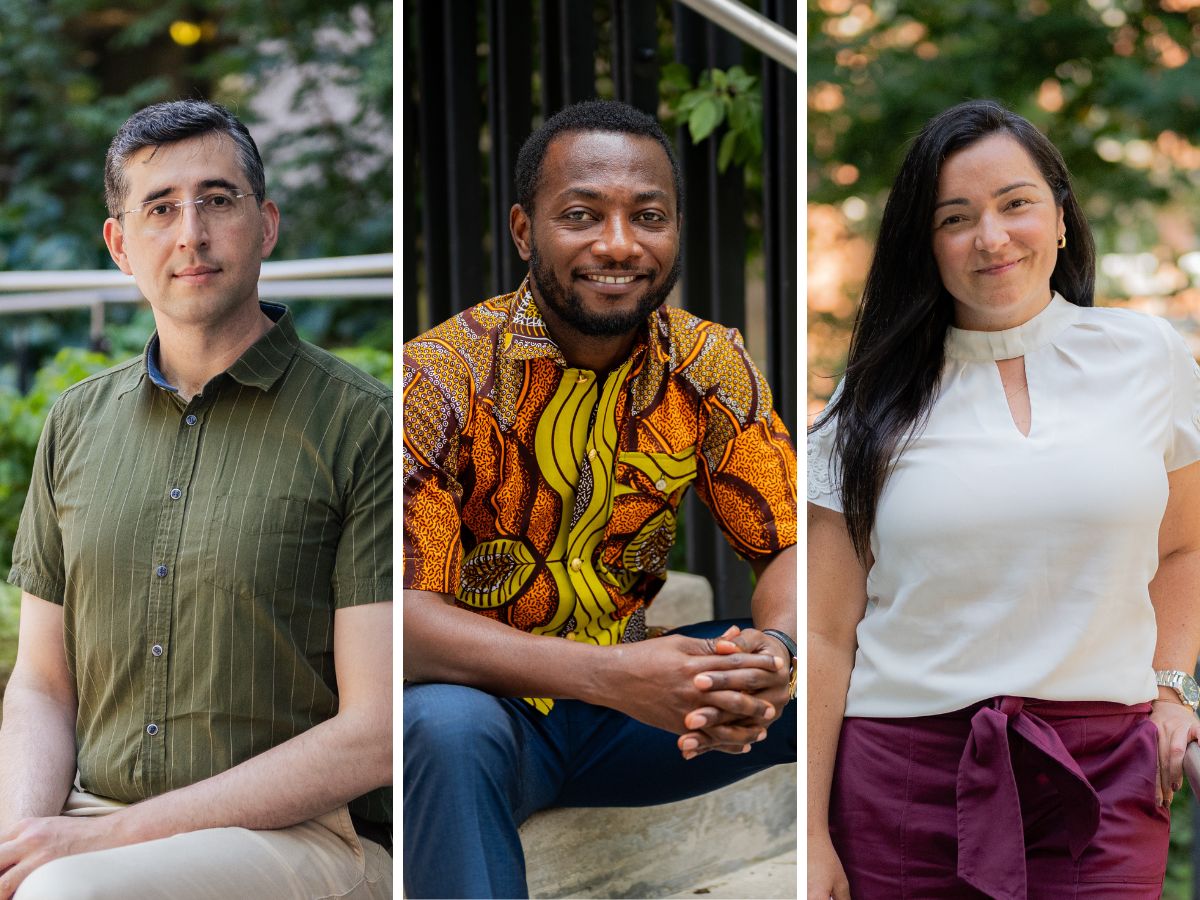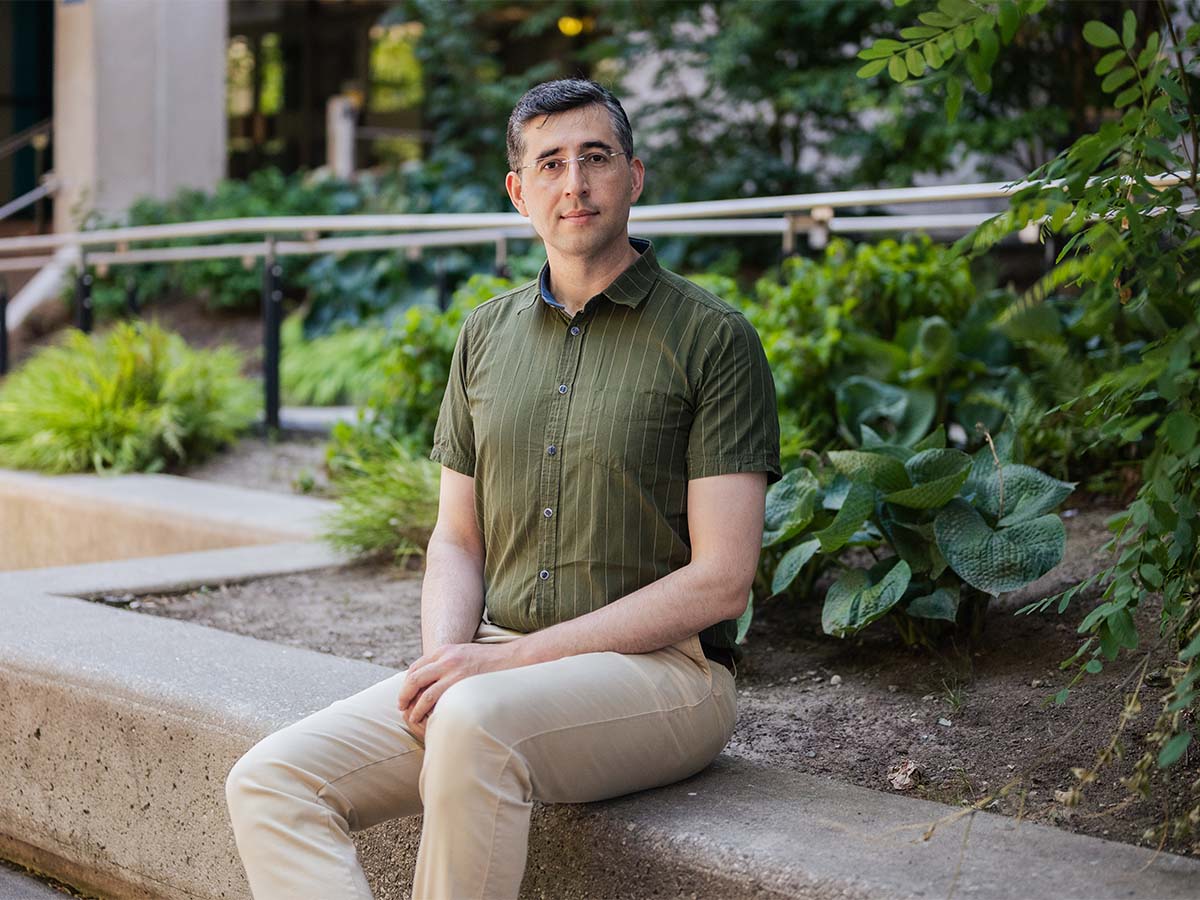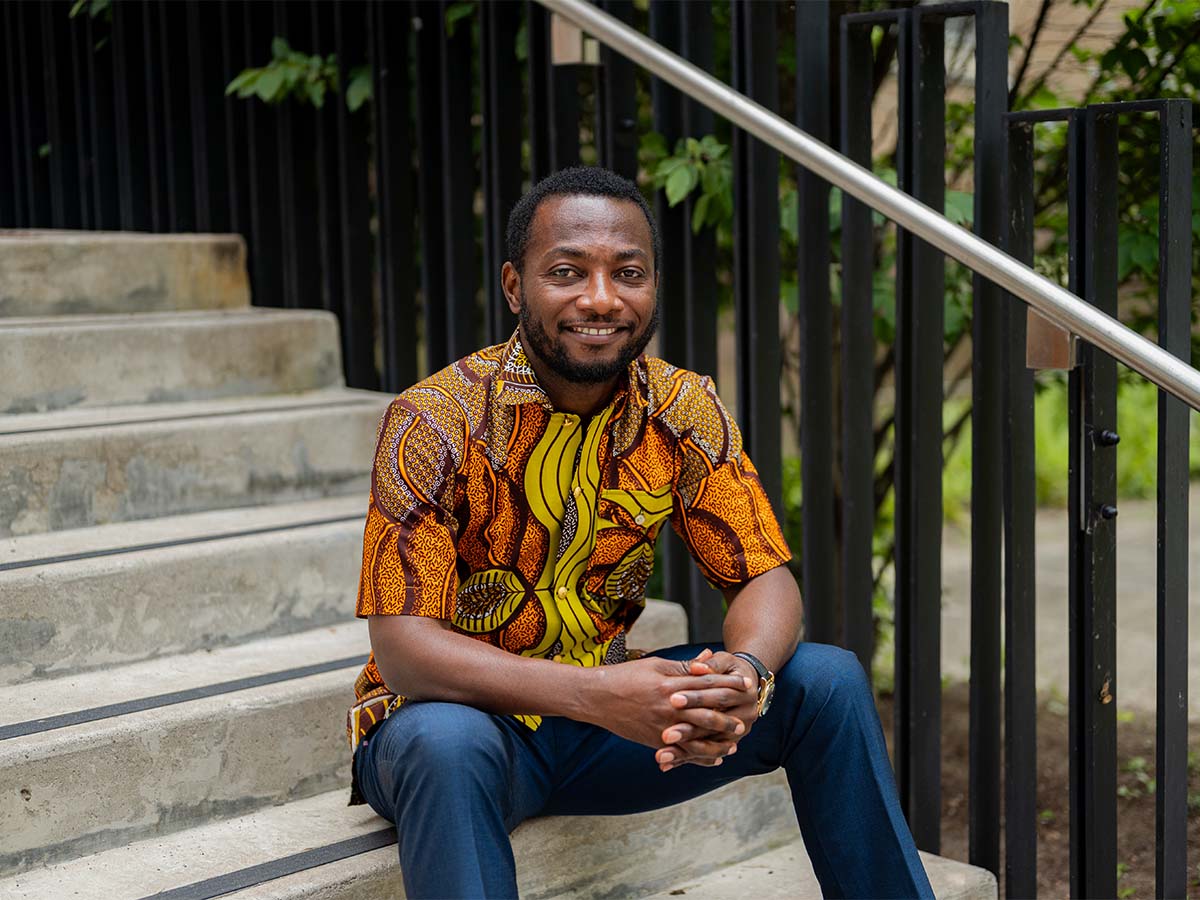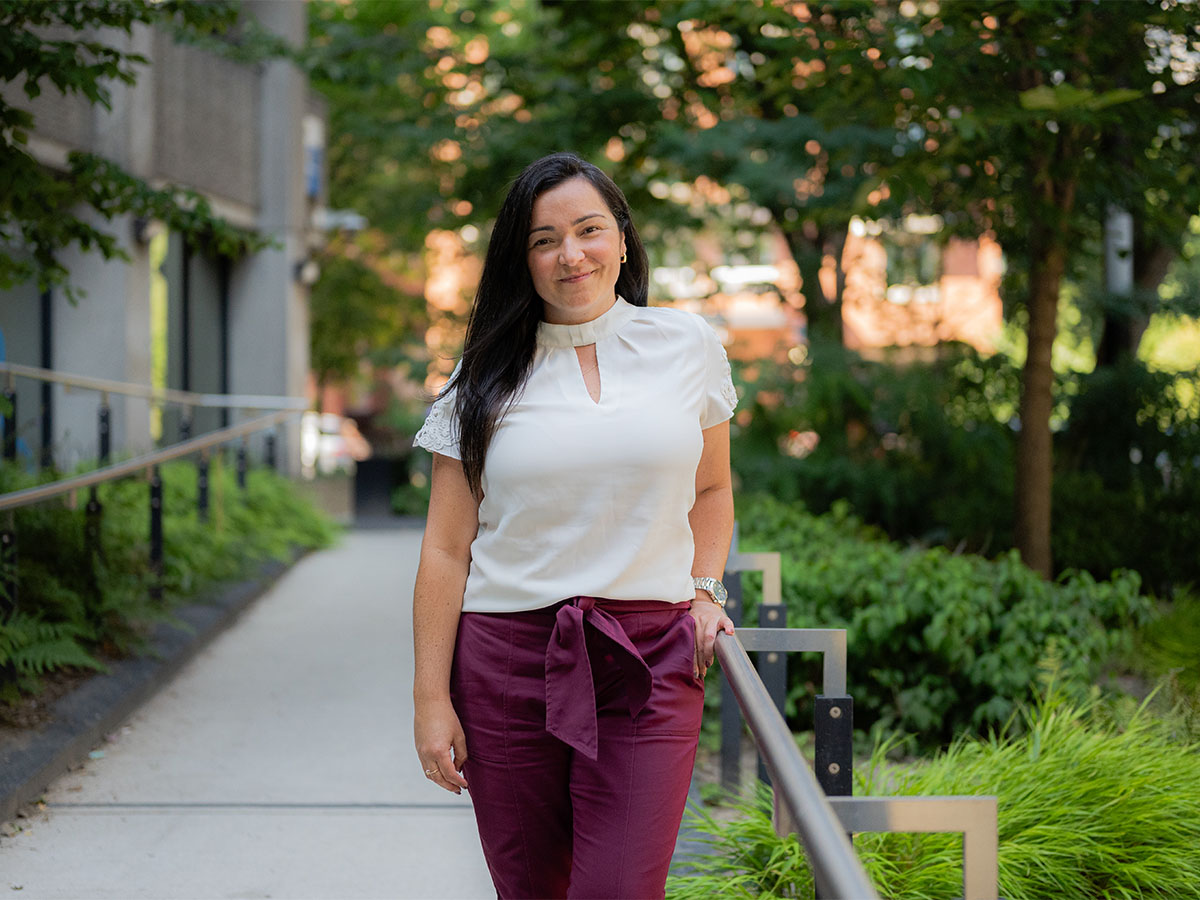Three tenure-track professors join the Faculty of Science this fall

From left to right: Dr. Navid Nasr Esfahani (Computer Science), Dr. Samuel Asante Gyamerah (Mathematics), Dr. Glaucia Melo dos Santos (Computer Science)
This fall, the Faculty of Science welcomes three new tenure-track professors: Navid Nasr Esfahani (Computer Science), Samuel Asante Gyamerah (Mathematics) and Glaucia Melo dos Santos (Computer Science). With expertise spanning data security, climate finance and human-AI interaction, these professors look to make significant contributions to research and teaching at TMU.
Learn more about their academic journeys and aspirations:
Navid Nasr Esfahani, Assistant Professor, Computer Science

Dr. Navid Nasr Esfahani
I work on schemes and tools for communicating and storing data securely and privately. In doing so, I explore and utilize interesting mathematical structures, develop programs and ensure that in these applications, the data will be available to authorized users and protected against unauthorized ones. In particular, my research focuses on scenarios where the adversary has access to all computational resources possible, such as quantum computers.
It is really hard to choose one course as my favourite. I teach topics that I enjoy, and I love to share them with students. I like upper-year courses because of the advanced-level conversations I get to have with students around security, theory and algorithms. At the same time, I also like lower-year courses, as they allow me to interact with students who have a fresh perspective on basic topics and question everything.
In teaching, I follow a student-centred learning philosophy. Learners have learning preferences, learning objectives and backgrounds that may vary from one individual to another. I have found that student-centred learning properly addresses the variety of learners' needs and learning preferences. This approach also results in a vibrant, less authoritative and more inclusive teaching environment that facilitates better communication and creates more room for personal growth. In addition, it increases learners' independence, which will help the future use of the subject matter. All in all, I hope that my students:
1. Go beyond memorizing and develop analytical and critical-thinking skills related to the course content. Computer science is a dynamic field, and students need to be able to employ these transferable skills and adapt to technological and scientific advancements.
2. Learn how to keep themselves up-to-date with technological advancements after graduation.
3. Are aware of their impact on society and the environment around them. Considering the predominance of computers in most levels of decision-making and communication in our world, this knowledge is especially crucial in areas related to computer science since the consequences of a decision regarding a system, software, protocol, or algorithm may not be limited to one project and can affect society and the ecosystem.
I am looking forward to establishing a research lab with strong ties to the industry and local communities. In my lab, I aim to design and develop security and privacy tools that benefit people, directly and indirectly, worldwide. Through this process, I will train generations of experts who can help make the digital world a more secure place through their professional contributions to academia, the industry and the community.
I enjoy various sports and physical activities, such as hiking, playing tennis and swimming. Besides that, I like learning, playing and listening to music. More recently, I have been focusing on tar, an instrument from the lute family. Last but not least, I love making and eating good food and good coffee.
Samuel Asante Gyamerah, Assistant Professor, Mathematics

Dr. Samuel Asante Gyamerah
As an interdisciplinary researcher, I draw from financial mathematics, mathematical modelling, machine learning and statistics to tackle complex financial and environmental challenges. By integrating tools from these diverse fields, I approach real-world problems from multiple angles, offering holistic solutions that address their interconnected nature. Some of my research applications include:
1. Integrating tools from financial mathematics, statistics, economics and climate science to develop pricing models for weather derivatives to protect farmers from losses caused by unpredictable weather events, such as cold spells, heat waves or insufficient rainfall.
2. Applying epidemiological models originally designed to model the propagation of diseases to the domain of financial contagion in the financial sector. By doing so, I explore how financial shocks can propagate through interconnected markets and institutions, potentially leading to systemic risk.
3. Using machine learning and actuarial mathematics tools to forecast mortality rates for major countries. Mortality forecasting is critical in risk management, demography and public health; it influences life insurance policies, pricing strategies and public pension plans. Accurate mortality predictions are vital for managing financial risks tied to life expectancy, maintaining reserves and ensuring the sustainability of social security systems.
As a postdoctoral fellow at the University of Waterloo, I worked on hybridizing rough volatility models with deep learning models. By improving volatility models with deep learning, my research helps provide more accurate and robust financial predictions, especially during periods of market turmoil, aiding risk management and pricing strategies in the financial industry.
As the son of a small-scale farmer from an Indigenous farming community in the southern part of Ghana, I had a first-hand experience of the impact of climate change on my family’s economic activities. Weather uncertainty, whether it's an abrupt drought, unexpected rainfall, floods or extreme weather conditions, significantly threatens the food security and profitability of small-scale farmers like my father. This experience motivated me to use financial mathematics to develop tools (weather derivatives) that could hedge farmers against adverse weather events, thereby enhancing the financial security and sustainability of the agricultural sector. I aim to ensure that small-scale farmers, not just in my home country but across the world, can access affordable and reliable risk management strategies against the growing threat of climate change. In summary, my research is motivated by my desire to find innovative and interdisciplinary solutions to mitigate the risks of an increasingly volatile and interconnected world.
I see numerous opportunities for collaboration, particularly in the areas of Financial Technology, Environmental Finance, derivatives pricing and financial times series prediction. I am excited to contribute to the Department of Mathematics' financial mathematics and computational statistics research groups, where my background will provide valuable insights. Additionally, I am excited about the possibility of working alongside colleagues from different disciplines to develop micro-certificate courses, workshops and seminars that bridge our collective expertise.
I am also excited about collaborating on projects with students, department members, research groups and industries whose research areas fall within my expertise. These collaborations, I believe, will lead to innovative research ideas and projects that will directly impact my teaching and mentoring skills. I look forward to the opportunity to contribute to the University’s success and to grow within TMU’s inspiring academic community.
Outside of work, I enjoy spending time with family. I love to listen to Afrobeat music, which helps me to connect with my cultural heritage. On weekends, I love to experiment with different cooking recipes using YouTube videos as a guide. These creative outlets not only help me maintain balance but also serve as a source of inspiration, often sparking fresh ideas and perspectives that I bring into my research.
Glaucia Melo dos Santos, Assistant Professor, Computer Science

Dr. Glaucia Melo dos Santos
My research sits at the intersection of software engineering and AI-driven development, focusing on how large language models (LLMs) can enhance and transform how software is designed and implemented. By exploring human-AI interaction, I aim to understand how software developers can effectively collaborate with AI tools when generating and refining code within context-aware systems. My work seeks to create AI models and systems that generate accurate code and understand and adapt to the nuances of different programming contexts, ultimately leading to more intelligent, responsive and efficient software development processes and tools.
The future of generative AI is incredibly exciting and should impact how we live and work. We'll see AI creating hyper-personalized experiences in education, marketing and beyond, making our interactions more tailored and meaningful. Human-AI collaboration will become more natural, with AI taking on routine and repetitive tasks so we can focus on creativity and strategy. As AI becomes more integrated into our lives, the importance of ethical development will grow as well. I believe we'll also see more specialized AI models for different industries and incredible advancements in creative fields. With AI merging with technologies like AR and VR, and the rise of hardware and computing power, we’ll experience even more immersive environments and solutions in healthcare and education. Speaking of education, I trust AI will create adaptive learning experiences that cater to individual needs, so I also see the education sector adapting to the widespread use of tech with AI. I expect generative AI will bring innovation and efficiency while—hopefully—challenging us to think carefully about its ethical implications.
At TMU, I’m excited to build a vibrant research program that explores the intersection of software engineering and AI-driven development. I look forward to working with students on innovative research that bridges academia and industry. My goal is to create an environment where students and researchers can collaborate on projects that push the boundaries of what’s possible with AI, particularly in autonomous systems, human-AI interaction and contextual computing. I aim to publish impactful research, build partnerships with industry and develop courses that prepare students for the evolving tech landscape. I hope to make an impact at TMU by fostering innovation, collaboration and a deep commitment to academic excellence.
I enjoy spending time in nature, whether walking with my dog or relaxing by the fire or the sea (or lake since living in Ontario) with friends and family. I love reading, especially books that challenge my thinking. Cooking is another passion of mine—I find experimenting with new recipes relaxing and creatively fulfilling. I never cook the same thing twice because I love to experiment, and I never know exactly what I did last time! These activities help me recharge and keep a balanced life.